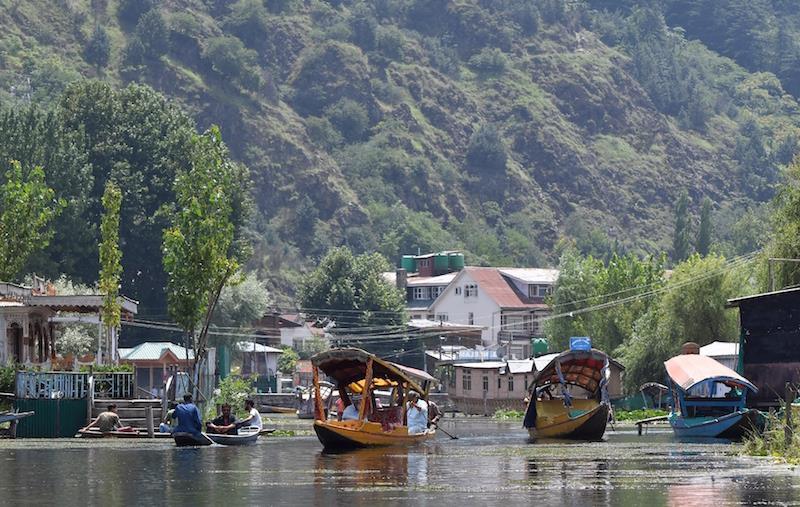
US Survey Says Plebiscite A Preferred Choice Among Young Kashmiris
(MENAFN- Kashmir Observer) CRPF personnel enforcing a lockdown in Srinagar- Photo credit AP
Srinagar : More than 90 per cent of higher education students surveyed by a researcher from a government-run university in Kashmir and a New York college have favoured a referendum to resolve the Kashmir issue.
Approximately 600 college and university students were part of the survey conducted by researchers from Central University of Kashmir and New York's Skidmore College in the wake of New Delhi's decision to revoke the Muslim-majority region's special status last August.
Some of the findings of the yet-to-be-published survey funded by a Skidmore College Faculty Development Grant, were reported by The Washington Post . The article is authored by Yelena Biberman, one of the surveyors and assistant professor of political science at Skidmore College in New York and Samir Ahmad, an assistant professor of governance and politics at the Central University of Kashmir.
'Among our survey respondents, the preferred route to resolving the Kashmir conflict was a plebiscite in which Kashmiri people vote to determine the future of their region. Fully 91 per cent of our survey respondents were optimistic about this option — with 81 per cent deeming this approach very effective,' the article in the Post says.
How we conducted our research
'Between October and December 2019, while Kashmir was in lockdown mode, we surveyed 593 college and university students to study the effects of militarization on political attitudes. We conducted our surveys in capital Srinagar and surveyed students using the time-space sampling technique at randomly selected locations on university and college campuses and surrounding areas', Biberman said.
We wanted to focus on the 'generation of rage' and the new activism that played a leading role in the 2016-2017 uprisings. At the time, widespread student protests in the Kashmir Valley left hundreds of students injured in clashes with armed forces, and there were many student arrests.
While New Delhi maintains that the region is an integral part of the country, conducting a plebiscite that lets Kashmiris choose to accede to either India or Pakistan has been a long-standing demand in Kashmir. However many who would like to see the region remain independent of both nations believe that the plebiscite, in its current form, might not adequately address popular aspirations.
In 1953, India's first Prime Minister Jawaharlal Nehru promised to conduct a plebiscite in Kashmir to resolve the conflict, but it was never implemented.
On the question of seeking Pakistan's support in the potential resolution of the conflict, 64 percent participants responded positively, while 79 percent said they would like Western mediators to consider Kashmiris a central party in any negotiations.
The survey results appear to contradict the Hindu nationalist government's claim that by revoking Article 370 - which granted limited autonomy to Kashmir - it would be able to bring the decades-long conflict to an end by fully integrating Kashmir into India.
Professor Sreeram Chaulia, dean of Jindal School of Global Affairs, said it was "too soon" to gauge the opinion of Kashmiris on the effects of Indian move in Kashmir.
"It has only been seven months since the revocation of autonomy, and we will, at least, have to wait for five to 10 years to survey the nature of popular perceptions regarding this move," he told Al Jazeera.
Chaulia said the sample size of nearly 600 students out of a population of seven million was not representative. He did not elaborate.
In an interview with Aljazeera , Biberman defended the research methodology. "Our methods successfully went through an IRB [Institutional Review Board] process at Skidmore College," she said. The IRB reviews all research involving human subjects and includes ethical, institutional, legal, scientific and social implications of a research project.
Non Violence a preferred mode of resistance
Survey respondents also favored nonviolent resistance to Indian rule. An overwhelming majority (92 percent) considered nonviolent methods effective — but 64 percent considered the continuation of militancy and violence as useful for bringing about long-lasting peace in the region, according to The Washington Post.
'Most of our survey respondents want to see a complete withdrawal (91 per cent) of Indian troops, or at least a decrease in India's military presence (92 per cent). Kashmir is perhaps the most densely militarised zone in the world. Before the August crackdown, it had roughly one soldier for every 10 civilians.'
4 Point Formula
Interestingly, the so-called "four-point formula" for resolution of the dispute in Kashmir, deemed a brainchild of former Pakistani President Pervez Musharraf, remains popular with the young Kashmiri respondents to the study.
Under this scenario, the Line of Control would have transit points for people-to-people exchanges, free trade and other economic opportunities. Kashmiris would have special rights to move and trade freely on both sides of the control line.
However, Hafsa Kanjwal from Lafayette College in the US believes this can be seen as a desperate, short-term response towards India's unwillingness to engage with the core political issue in the region, according to Al-Jazeera.

Legal Disclaimer:
MENAFN provides the
information “as is” without warranty of any kind. We do not accept
any responsibility or liability for the accuracy, content, images,
videos, licenses, completeness, legality, or reliability of the information
contained in this article. If you have any complaints or copyright
issues related to this article, kindly contact the provider above.


















Comments
No comment